

Moving our endowment beyond fossil fuels and reinvesting in our future. Divest Harvard (DivestHarvard) sur Twitter. Fb: Divest Harvard. Divest Harvard - youtube channel. A Bad Climate for Divestment. In the fall semester of 2009, a group of Harvard students founded a college chapter of Students for a Just and Stable Future.
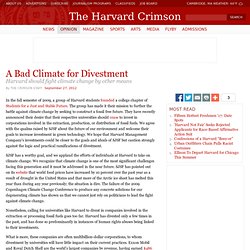
The group has made it their mission to further the battle against climate change by seeking to construct a fossil free future. They have recently announced their desire that their respective universities should cease to invest in corporations involved in the extraction, production, or distribution of fossil fuels. We agree with the qualms raised by SJSF about the future of our environment and welcome their goals to increase investment in green technology.
We hope that Harvard Management Company’s investments could be closer to the goals and ideals of SJSF but caution strongly against the logic and practical ramifications of divestment. SJSF has a worthy goal, and we applaud the efforts of individuals at Harvard to take on climate change. TheCrimson: Professors Urge Action on Climate Change. Although issues such as the economy and health care overshadowed climate change in this year’s presidential candidates in this year’s presidential election, affiliates at the Harvard Kennedy School said that President Obama can no longer ignore the environment in light of Hurricane Sandy.
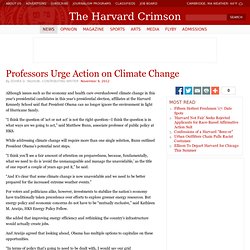
“I think the question of ‘act or not act’ is not the right question—I think the question is in what ways are we going to act,” said Matthew Bunn, associate professor of public policy at HKS. While addressing climate change will require more than one single solution, Bunn outlined President Obama’s potential next steps. “I think you’ll see a fair amount of attention on preparedness, because, fundamentally, what we need to do is ‘avoid the unmanageable and manage the unavoidable,’ as the title of one report a couple of years ago put it,” he said. “And it’s clear that some climate change is now unavoidable and we need to be better prepared for the increased extreme weather events.” Faust: Fossil Fuel Divestment Statement. Dear Members of the Harvard Community, Climate change represents one of the world’s most consequential challenges.
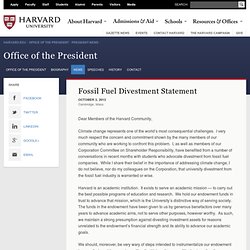
I very much respect the concern and commitment shown by the many members of our community who are working to confront this problem. I, as well as members of our Corporation Committee on Shareholder Responsibility, have benefited from a number of conversations in recent months with students who advocate divestment from fossil fuel companies. While I share their belief in the importance of addressing climate change, I do not believe, nor do my colleagues on the Corporation, that university divestment from the fossil fuel industry is warranted or wise. Harvard is an academic institution. We should, moreover, be very wary of steps intended to instrumentalize our endowment in ways that would appear to position the University as a political actor rather than an academic institution.
We offer some 250 courses in the broad domain encompassing environmental studies and energy. Faust: Fossil Fuel Divestment Statement. Vimeo: This is the Case - Raw. 350 : Does Harvard Pres Drew Faust... Why We Must Divest From Fossil Fuels: A Student’s Open Letter to Harvard President Drew Faust. Share The movement for fossil-fuel divestment has swelled to what an Oxford University study calls the fastest-growing divestment movement in history, one with the potential to shift the political ground beneath the fossil-fuel lobby’s feet.
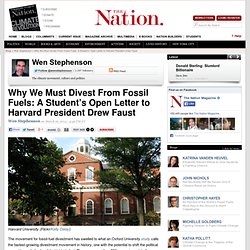
There are more than 500 campaigns globally—including on some 400 college and university campuses in the United States, along with city and state governments and major religious institutions. Ten colleges and more than twenty cities—including Seattle, San Francisco and, as it happens, Cambridge, Massachusetts—have committed to divest. Back in October, Harvard University President and distinguished American historian Drew Gilpin Faust, having faced more than a year of increasing calls by students, faculty and almuni to divest from fossil fuels, released a statement in which she explained why Harvard would do no such thing, at least not on her watch. Franta’s open letter follows here. March 19, 2014 Benjamin Franta Gordon McKay Lab 9 Oxford St. Faust: Fossil Fuel Divestment Statement. Clean energy drowned out in Washington by a Two Billion Dollar Juggernaut.
Exclusive: Harvard President Faust Says Fossil Fuel Companies Are Not Blocking Clean Energy. By Joe Romm "Exclusive: Harvard President Faust Says Fossil Fuel Companies Are Not Blocking Clean Energy" In this June 30, 2009 file photo, Harvard University President Drew Faust speaks during an interview with The Associated Press on the Harvard campus in Cambridge, Mass.

CREDIT: AP Photo/Charles Krupa, File. Harvard blijft investeren in fossiele brandstoffen. Harvard blijft investeren in fossiele brandstoffen Ondanks zware druk van studenten en milieuactivisten weigert Harvard University zijn investeringen in fossiele brandstoffen te stoppen.
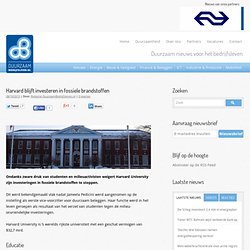
Dit werd bekendgemaakt vlak nadat Jameela Pedicini werd aangenomen op de instelling als eerste vice-voorzitter voor duurzaam beleggen. Haar functie werd in het leven geroepen als resultaat van het verzet van studenten tegen de milieu-onvriendelijke investeringen. Harvard University is ‘s werelds rijkste universiteit met een geschat vermogen van $32,7 mrd. Educatie Drew Faust, bestuursvoorzitter van Harvard, stelt in een brief dat de instelling niet van plan is van koers te veranderen. “Het stoppen met investeren is geen verstandige of te rechtvaardigen keuze. Verder draagt Faust het argument van onafhankelijkheid aan.
Innovatie Uit resultaten blijkt dat dit geen impact heeft gehad op de financiële toestand van de instellingen.